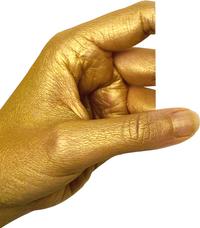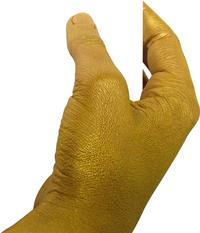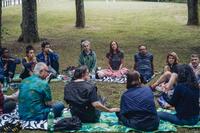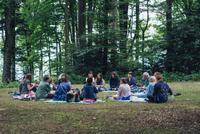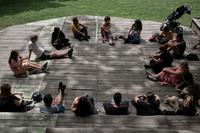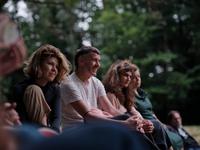Education from Below
Education from Below is a two-year collaborative programme organised between the Rijksakademie van beeldende kunsten, Amsterdam, MACBA, Barcelona and WHW, Zagreb.
Art as a site for learning
Education from Below explores art as a place for dialogue, collective learning and imagination. Education doesn't belong only in institutions, but it can be horizontal and come from below, from communities.
The project recognises that art practices can dislocate the usual hierarchies of what should or should not be learned and traditional divisions between theory and practice, and that knowledge does not have to be based on accumulation, but rather on sharing and mutual learning.
The partners will explore new models of art practice based on collective learning and will generate a network of institutions and professionals for sharing methodologies.
Network
Education from Below links three independent programmes for artists, Rijksakademie van beeldende kunsten, PEI at MACBA, and WHW Akademija that each provide important opportunities for artistic development outside of formal education systems. The project will be realised over the course of autumn 2019 – autumn 2021 through seminars, study groups, artist residencies, exhibitions, series of lectures, an international conference, a collective reader and a common web platform, involving many artists, thinkers and educators.
Support
- Amor RojoResearch, Writing and Practice Group, with Dora García
- Amor y revolución
- Feldenkrais sessionsYael Davids
- Frigiti ToriHoming (Charlaine Reval & Laura O’Neill)
- KoekplankBert Scholten
- Pulp / Our Rags MagazineAimée Zito Lema & Elisa van Joolen
- Sharing artistic^educational*social practicesAnnette Krauss
- BorderlinesManuel Pelmuş
- Movement as an ExhibitionManuel Pelmuş
- (180 words) between citizen and consciousBanu Cennetoğlu
- i know it well but nevertheless?Banu Cennetoğlu
- –
Towards a new eco-social imaginationNarratives and transitions in the face of the crisis of civilization- –
Drei Tage bis zum Ende der Kunstcurated by Ana Dević- –
Do Not Trace, Draw!Ana Hušman & Dubravka Sekulić, Dan Perjovschi- –
PlagueCultural Ecologies Research Group- –
Sensing SalonDenise Ferreira da Silva and Valentina Desideri- –
Decolonise, Democratise, DeeliticiseMax Jorge Hinderer Cruz- –
One is Always a Plural: moving together over distanceYael Davids- –
Walking DistanceVlatka Horvat- –
Positions, Speculations, and Practices Toward an Eco-Socialist MuseumPablo Martínez- –
In Mourning and In RageMarwa Arsanios, selma banich- –
Summer Schoolwith Pablo Martínez and Vlatka Horvat- –
REGENERATION: (Soma)tic Poetry Rituals for New Growth in Art and PoetryCAConrad- –
Red Door ProjectGabriella Gomez-Mont and Antonio Vega Macotela- Systematurgy of A quatre potes (On Four Legs)nyamnyam and Pedro Pineda
- Culinary BOOSTDongwhan Kam & BOOST
- From Resilience to AntifragilityAna Dević
- –
Ac/kademie #4Art as Social Practice- Workshop by Flavia DzodanRadio Web MACBA Working Group
- The Coloniality of the AlgorithmFlavia Dzodan
- –
To be a leaf, to be a stone, to be the earthdirected by Maite Garbayo Maeztu- Antye GreieRadio Web MACBA Working Group
- La Cocina abiertaLaila El-Haddad, Maggie Schmitt, Marina Monsonís, Yayo Herrero
- –
The Right to the City WalkFemke Dekker, Werker Collective- Artistic Ecologies: New Compasses and ToolsPablo Martínez, Emily Pethick, Milica Vlajković, WHW
